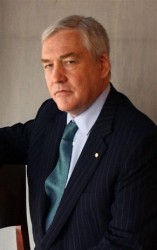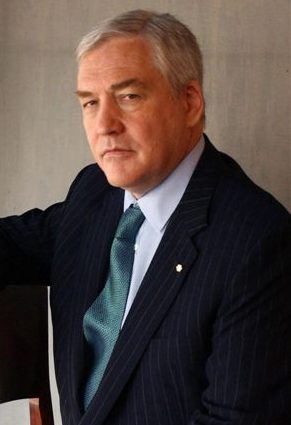 The federal government deserves credit for unveiling its plans for regeneration of Canada’s long-shrinking navy. Seven years have passed, inexplicably and expensively in terms of ultimate cost, since the prime minister announced that eight Arctic off-shore patrol ships with ice-breaking capacity would be built, the first to be delivered in 2013. Now we will have five or possibly six ships, the first to arrive in 2019, and they will be able to break up ice up to a metre thick. In deeper ice, they will have to be preceded by Coast Guard icebreakers.
The federal government deserves credit for unveiling its plans for regeneration of Canada’s long-shrinking navy. Seven years have passed, inexplicably and expensively in terms of ultimate cost, since the prime minister announced that eight Arctic off-shore patrol ships with ice-breaking capacity would be built, the first to be delivered in 2013. Now we will have five or possibly six ships, the first to arrive in 2019, and they will be able to break up ice up to a metre thick. In deeper ice, they will have to be preceded by Coast Guard icebreakers.
They are quite stylish ships, just over a hundred metres long, carrying a helicopter and 65 officers and crew. It had been intended that they could sail from Nanisivik, a harbour near the western end of Baffin Island, but that facility has been downgraded to a refuelling station, though that will still vastly increase the ability of these vessels to remain in Arctic waters from the present capability. Enhanced facilities will be built for them in Halifax and Esquimalt, B.C., from which ports they can go on extended tours into the Arctic, refuelling and resupplying from Nanisivik, with crew changes, in four-month stretches.
The vessels will be able to patrol the Northwest Passage during the four months that it is usually open, and the eastern and western approaches to the passage year-round. The area the ships will be able to access even in the depths of winter will be very substantially increased from what would be possible now (even if Canada had the vessels to spare for such a task). The Arctic is now a more sensitive and vulnerable ocean approach to the country than the Atlantic and Pacific, and we face the Russians directly across the North Pole at inconvenient distance from the Americans. Whatever our abrasions with the United States, it has by far the most powerful navy and air force in the world and has been effectively responsible for the security of Canada since Franklin D. Roosevelt assured a commencement-day audience at Queen’s University in Kingston in 1938 that his country would “not stand idly by” if Canada were attacked (implicitly, by Nazi Germany, Imperialist Japan, or Soviet Russia).
While it is not clear that climate change is occurring, there is no dispute that the polar ice cap has receded, facilitating foreign penetration of the Arctic adjacent to Canada; traffic through that ocean has considerably increased, and now goes well beyond that of the traditional neighbouring countries — Canada, the U.S., Russia, Norway, Denmark and Japan. Although the Russians have gone back to flying to the edge or even within Canadian airspace, disputes over sovereignty in the region are limited to that between Canada and Greenland (Denmark), over Hans Island, and between Canada and the U.S. over rights to 6,000 square miles of seabed in the Beaufort Sea, which is bordered by Alaska, the Yukon and the Northwest Territories.
There is also, in the $36.6-billion National Shipbuilding Procurement Strategy that was first outlined generally by the government in 2011 but hasn’t visibly moved since then, a further generation of surface ships for more temperate waters, and a heavy icebreaker for the Coast Guard, to be named after prime minister John Diefenbaker, in recognition of his emphasis on the Arctic and his “roads to resources” program of the late Fifties. The additional ships, which will be produced over 20 to 30 years, include 15 unclassified “surface combatants,” each about 20% larger than the very successful 12 Halifax-class frigates of 1992-1996. Three support ships and four other Coast Guard vessels are also in the program. The first of the new Arctic patrol boats will be named after Admiral Harry DeWolf, the swashbuckling Nova Scotian Second World War commander of the destroyer Haida.
Not as uplifting was the announcement of a government bill to amend the Criminal Code and provide for life imprisonment without parole for conviction of a category of heinous crimes: murders during sexual assault, kidnapping, acts of terrorism and the killing of police officers and prison guards. This is the latest in an eight-year sequence of Harper government legislation pandering to the most reactionary elements of the law and order-fixated public.
Over that time, sentences have been stiffened, new prisons commissioned, visiting rights reduced and rehabilitative initiatives downgraded, all in the interests of increasing the population of incarcerated people and reducing the possibility that those who are confined will ever return to normal life, no matter how abjectly they repent former wrongdoing. Under current law, those convicted of first-degree murder are not eligible for parole for 25 years. The new law would permit a prisoner sentenced to life to apply for “exceptional release ” to the public safety minister after 35 years, ostensibly to satisfy constitutional protections against cruel and unusual punishment (in the parlance of the U.S. Constitution, but a concept now recognized in all civilized jurisdictions).
Of course the crimes designated are abominable and of course those who commit them must be segregated from society as long as there is any realistic possibility of a recurrence in the event of release. But the law provides for that now. The aging of the population, the immense profusion of security cameras and even cellphone cameras, and smarter policing have all contributed to a very sharp, long-term reduction in crime. And as many commentators have written, including me, the chief victim of longer sentences and more obligatory custodial sentences, apart from the taxpayer, will be native people, whose problems are complicated and rarely conform to the conduct of other offenders and are not best answered in an identikit system of punitive vengeance.
Permanent imprisonment will raise the risks for those inmates and prison employees in contact with such convicts, who will have nothing left to lose.
Nor should the lives of police officers, and particularly prison guards, be valued above other lives. Any murder is a horrible crime and all victims of murder are equally valued in their deaths as in their lives. Prison guards are far from the most virtuous category of citizen. And permanent imprisonment, where there is no death penalty (whose restoration could be the next Harper brainwave in quest of votes that are already in his pocket — they’re not voting for Justin, Mulcair or Elizabeth May), will raise the risks for those inmates and prison employees in contact with such convicts, who will have nothing left to lose.
The point of a justice system is to deter and punish crime, protect society and promote the value of human life, both in punishing those who abuse or even kill others, and in keeping alive a possibility that even the most appalling crimes may be expiated by serving the sentence and showing genuine remorse, rehabilitation and repentance (as in penitentiary). This excruciating sequence of severe measures, wrenching discretion from the judges, professional criminologists and custodial services and arrogating to politicians in an election year the determination of who has no right to hope for a return to liberty, even after, but decades after, very barbarous crimes, is just shabby demagogy. This is not a country of Archie Bunkers, any more than it is a country of puling, do-good wimps.
There is something incongruous about such self-righteousness from a government that has so trampled the prerogatives of Parliament. Legislation is routinely rammed through on closure bills much more abrupt than that imposed by Louis St. Laurent and C.D. Howe on approval of the Trans-Canada Pipeline in 1956, a good and imaginative measure that was unreasonably obstructed by the filibustering opposition.
Everyone must benefit from a presumption of innocence, but there is a considerable possibility that somebody in this proceeding may be guilty of something, and Mr. Duffy, though the only accused in his trial, in the opinion of many insiders in all parties, is not necessarily the only suspect.
Conrad Black is the founder of the National Post. His columns regularly appear in the National Post on Saturdays. For more opinion from Conrad Black, tune into The Zoomer on VisionTV (a property of ZoomerMedia Ltd.), Visiontv.ca.
Mr. Black graciously allowed us to reprint this article on CFN.

Does anyone pay attention to what Conrad Black says any more?
Comment policy reminder
CFN has a new comment policy. You must use your real first and last name. As well if your email bounces we will terminate your posting privileges.
We value all input from our amazing CFN viewers and are always trying to improve the viewer experience which includes making this a safe, informative, and entertaining platform.
If you have any questions please email info@cornwallfreenews.com
Actually, Hugger, he’s been writing some pretty insightful stuff lately. He’s bang on about Harper’s asinine law and order BS.
A very refreshing article
I guess some may see Conrad Black as still relevant. IMHO his time was over years ago.